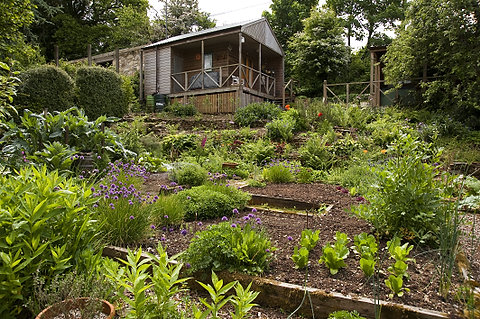
Raised beds terraced on a hillside at Trelyn. Photographs: Charles Francis
July 2011: For hundreds of years, the people of Polmassick and the surrounding area would gather at the village grist mill to grind their corn. This month, the mill will once again be a meeting place for the community. It is the final stop on a garden safari around the parish of St Ewe — the cream tea stop.
The garden created by Richard and Janet Lockyer, who now live in the former mill building, enjoys the shelter of a woodland backdrop. Mature shrubs border the lawn where the teas will be served, and a path curves around the front of the house to a cottage garden with roses and delphiniums, and a sundial at its centre.
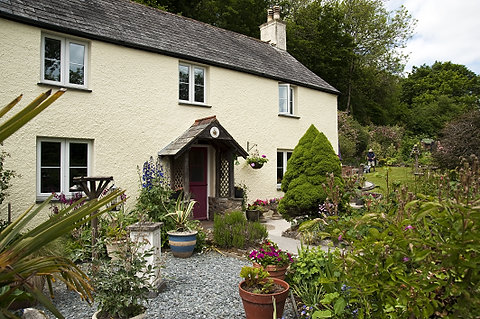
The garden at Mill Cottage
It is hard to believe that this tranquil spot was once a place of rumbling machinery and rushing water. “The building is known to have been standing in 1640, which is far as records go back,” says Richard. “The mill was still going until the First World War. There was also a small farm here, and I suppose there would have been a garden plot.”
There is still a vegetable plot and some hens. The old English Marans lay lovely chocolate brown eggs, says Richard, and their reward is a luxury hen house, complete with lighting. “It encourages them to lay more,” he explains.
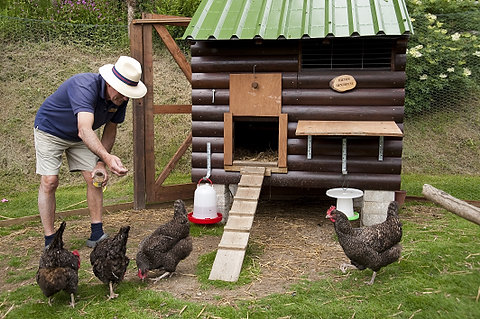
Feeding the Maran hens at Mill Cottage
The garden at Mill Cottage is one of eight open to the public for the safari, run jointly by St Ewe Village Hall and the parish church. Although much has changed since the mill’s heyday, this is still a parish of sparsely-populated villages, hamlets and farms. St Ewe is lush and beautiful and feels remote, yet it is only a few miles away from the centre of St Austell.
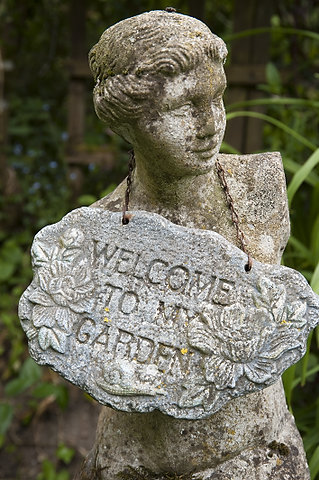
Along with other towns and villages in the area, the parish was deluged by floods following heavy rainfall in November last year. The stream which flows through Roger and Flora Cumbers’ garden burst its banks, uprooted plants, and swept over the wall of the garden on the opposite bank.
But the couple were undeterred by the prospect of restoring their riverbank borders. It was just the latest challenge they have faced since they came to live at Trelyn, in Polmassick, 11 years ago, and as novice gardeners, had to deal with a plot in a frost pocket where nothing wanted to grow.
“There were just beech trees here, and it was hard to get things going underneath them,” says Flora. “So we decided to bring in some planters, and plant them up with things like camellias and skimmias. The alternative would have been to use imported soil, which I didn’t want to do.
“Over the years, we have found things which do well by the beech trees, like winter-flowering lonicera and euphorbias. In the spring we get primroses, daffodils, anemones and bluebells there.”
She describes the rest of the garden as “a bit of an experiment”. ”It was a question of trial and error — and there was a lot of error. You might say there is a certain informality bordering on wildness,” she says with a smile.
“We have foxgloves growing all over the place, including on the edge of the vegetable plot. I pull some out, but most I like to leave. The potager has chives everywhere, rhubarb which comes up every year, poppies and lovage.”
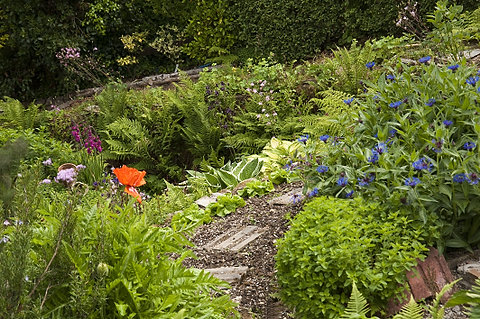
Cottage garden at Trelyn
Recycling is an essential aspect of Flora and Roger’s gardening style. When they built their house, they made use of blocks from the bungalow which previously stood on the site to make a pathway by the lawn. The old bath is now a small raised pool, while the roof timbers have been used in the raised beds in the potager.
Like the Lockyers and the Cumberses, Richard and Pat Burcher, who live at Lower Crosswyn Cottage on the outskirts of St Ewe, have a vegetable patch. But their garden is as different from the cottage garden at the mill as it is from the “informal, bordering on wild” garden created by Flora and Roger.
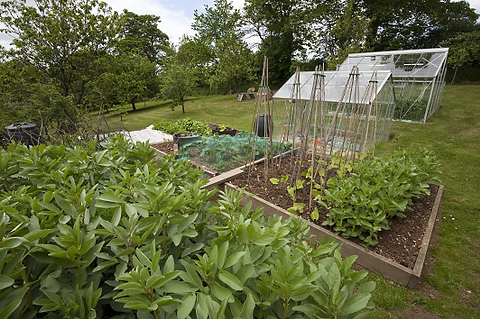
Vegetable gardening in the orchard at Lower Crosswyn Cottage
An elegant summerhouse looks out over immaculate lawns and gravel paths, with an abundance of fruit trees beyond. “The orchard has a wide variety of plums and damsons, as well as the apple trees, which are profuse,” says Richard. “We have a press, and make our own apple juice.”
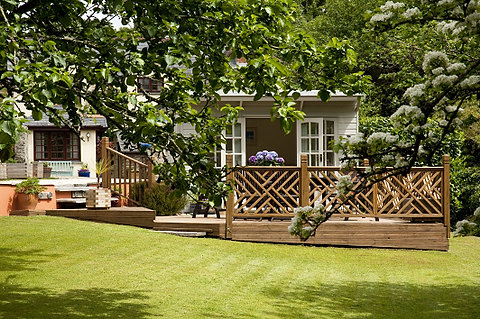
The Summer House at Lower Crosswyn Cottage
Taking part in a garden safari will be a new experience for him. “I’ve never shown anyone around the garden before, but it’s good to do something which will raise money for the church and the village hall,” he says.
Across the parish, safari participants are preparing to put the finishing touches to their gardens. They’re all hoping that one of their visitors will be the sun.
